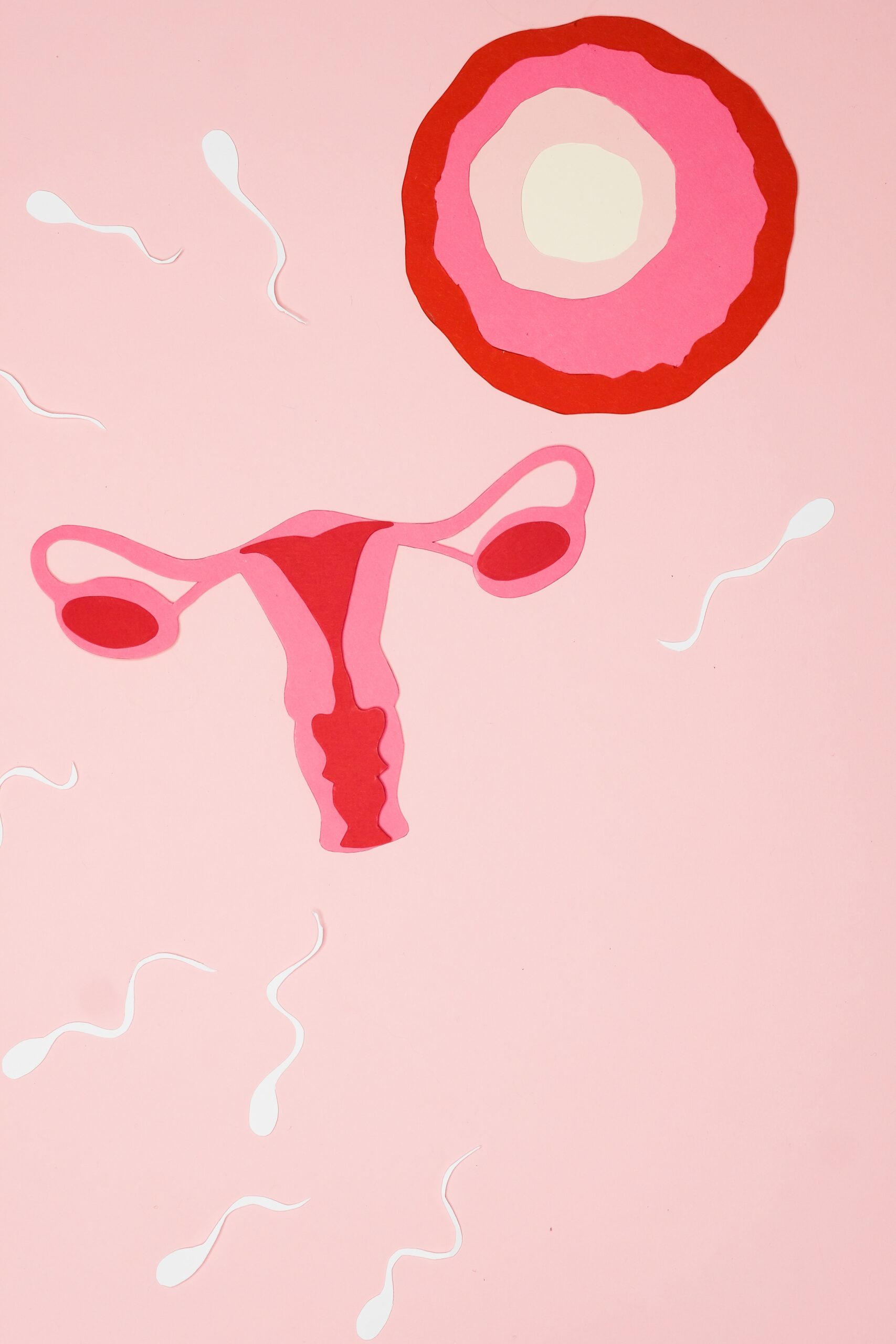If you’re looking to enhance your reproductive health or gain a better understanding of fertility signals, focusing on hormonal health is essential. Hormones play a pivotal role in fertility, and comprehending their impact is crucial for anyone aiming to optimize their reproductive well-being. Understanding this vital connection can empower you to make informed decisions about your health.
Hormonal health refers to the delicate balance of hormones in the body, including sex hormones like estrogen, progesterone, and testosterone, as well as other hormones that regulate metabolism, mood, and other bodily functions.
Conversely, fertility is the ability to conceive and carry a healthy pregnancy to term. While these two concepts may seem distinct, they are inextricably intertwined, and irregularities in hormone levels can have a profound impact on reproductive function.
In this blog post, we’ll explore the connection between hormonal health and fertility and provide insights into how you can support both to optimize your reproductive health. This information can be incredibly valuable whether you’re actively trying to conceive or simply looking to understand your body better.
Understanding the role of hormones in fertility is crucial in maintaining reproductive health. In the following section, we’ll explore the hormones involved in the menstrual cycle and how they work together to regulate ovulation and menstruation. By understanding this process, we can gain valuable insights into our own hormonal health and fertility.
So, let’s dive in!
The Role of Hormones in Fertility

Hormones play a crucial role in regulating fertility, orchestrating the menstrual cycle and ovulation through a complex interplay. By understanding how these hormones function together, you can gain valuable insights into your fertility and overall hormonal health, helping you better prepare and manage your reproductive cycle.
Some of hormones involved in the menstrual cycle include:
- Follicle-stimulating hormone (FSH)
- Luteinizing hormone (LH)
- Estrogen
- Progesterone
The pituitary gland in the brain produces FSH and LH, while the ovaries produce estrogen and progesterone.
Here’s how these hormones work together to regulate ovulation and menstruation:
- FSH stimulates the growth of follicles in the ovaries, which contain eggs.
- Upon maturation, the follicles generate estrogen, which thickens the uterine lining in preparation for pregnancy.
- As estrogen levels rise, they trigger a surge in LH, which causes the dominant follicle to release its egg (ovulation).
- After ovulation, the empty follicle begins producing progesterone, which helps further thicken the uterine lining and prepares it for the potential implantation of a fertilized egg.
- If fertilization does not occur, estrogen and progesterone levels drop, triggering the shedding of the uterine lining (menstruation).
The menstrual cycle is a complex process that involves several hormones working together to regulate ovulation and menstruation. When any of these hormones are imbalanced, it can significantly impact fertility.
The next section explores some of the most common hormonal imbalances affecting fertility, including PCOS, hypothyroidism, hyperprolactinemia, and endometriosis.
By understanding these conditions and their potential effects on fertility, individuals can be better equipped to address them and work towards their reproductive goals.
Hormonal Imbalances That Affect Fertility

Hormonal imbalances are a primary concern in fertility issues, often manifesting through conditions like Polycystic Ovary Syndrome (PCOS), Hypothyroidism, Hyperprolactinemia, and Endometriosis. Each of these conditions can disrupt hormonal equilibrium and affect fertility in significant ways.
Let’s delve into how these hormonal disorders impair fertility, understanding their mechanisms and impacts.
PCOS
(aka Metabolic Reproductive Syndrome)
PCOS (Polycystic Ovary Syndrome) is a common hormonal disorder that affects reproductive-aged individuals with ovaries. While PCOS is often referred to as a single condition, different forms of PCOS have distinct hormonal profiles and symptoms.
- The most common type of PCOS is characterized by elevated levels of male hormones, known as androgens. These hormones can lead to symptoms such as acne, unwanted hair growth on the face and body, and male-pattern baldness. This form of PCOS is often associated with insulin resistance—a condition in which the body doesn’t use insulin effectively. While insulin resistance is a hallmark of this type, it can also be present in other forms of PCOS. This condition can make weight management challenging, as it often leads to weight gain and difficulty losing weight.
- Another variant of PCOS is characterized by elevated levels of luteinizing hormone (LH), which is crucial for ovulation. This form is less common and might be overlooked because those affected can still ovulate, though often irregularly. Elevated LH, particularly when the LH to FSH (Follicle Stimulating Hormone) ratio is high, can be observed in various types of PCOS, not just one specific type. Common symptoms of this condition include irregular menstrual cycles and the development of ovarian cysts—fluid-filled sacs located within or on the ovaries.
- PCOS may also be characterized by elevated levels of anti-Müllerian hormone (AMH), a hormone associated with the growth of ovarian follicles—the structures that hold and release eggs. Elevated AMH is common in various forms of PCOS and often signals more severe ovarian dysfunction. Individuals with this type of PCOS typically experience irregular periods due to high AMH levels, but they may not exhibit other typical symptoms such as acne or significant hair growth. High AMH levels generally indicate a larger reserve of follicles in the ovaries.
Each type of PCOS has unique characteristics and symptoms, making it crucial to get a proper diagnosis and tailored treatment support. Understanding these variations can empower you to navigate PCOS with greater insight and confidence.
Hypothyroidism:
Hypothyroidism, a condition where the thyroid gland does not produce enough thyroid hormone, can also affect fertility. Low thyroid hormone levels can interfere with ovulation, making it harder to get pregnant.
- Hypothyroidism is when the thyroid gland does not produce enough thyroid hormone. The thyroid gland is located in the neck and produces hormones that regulate metabolism and energy levels in the body. When the gland doesn’t produce enough hormones, it can lead to many symptoms and health problems.
- Some common symptoms of hypothyroidism include fatigue, weight gain, hair loss, constipation, dry skin, and sensitivity to cold. These symptoms can vary in severity depending on the individual and the underlying cause of their hypothyroidism.
- In terms of fertility, hypothyroidism can have a significant impact. The thyroid hormones are crucial in regulating ovulation and maintaining a healthy pregnancy. When these hormones are deficient, it can lead to irregular menstrual cycles, anovulation, and difficulty conceiving.
- Women with hypothyroidism who become pregnant are also at increased risk of complications such as miscarriage, preterm labor, and preeclampsia. Therefore, It is crucial for women who are trying to conceive to have their thyroid function checked regularly and receive appropriate treatment if necessary.
Conventional treatment for hypothyroidism typically involves taking synthetic thyroid hormone medication to replace the hormones that the thyroid gland is not producing. Holistic treatment approaches, on the other hand, focus on addressing the underlying causes of the hormonal imbalance through diet, lifestyle changes, and natural supplements. These might include incorporating foods rich in iodine and selenium, stress reduction techniques such as yoga or meditation, and the use of herbs that support thyroid function like ashwagandha and guggul. With proper treatment, many women with hypothyroidism can successfully conceive and have healthy pregnancies.
Hyperprolactinemia:
Hyperprolactinemia is a condition characterized by high levels of prolactin, a hormone that stimulates milk production, in the blood. This can lead to irregular periods and difficulty conceiving.
- Hyperprolactinemia is a condition that occurs when there is an overproduction of prolactin, a hormone that stimulates breast milk production in women.
- Various factors, including tumors in the pituitary gland, medications, and hypothyroidism, can cause this condition. In addition to affecting milk production, high prolactin levels can disrupt ovulation and menstruation, leading to fertility problems.
- Some common symptoms of hyperprolactinemia include irregular periods, milk production outside of breastfeeding, decreased sex drive, and infertility.
Conventional treatment for hyperprolactinemia typically involves medication to lower prolactin levels and address the condition’s underlying cause. Holistic treatment approaches may focus on nutritional support, stress management, and herbal remedies. Integrating a diet rich in vitamin B6 and zinc can help manage prolactin levels naturally, while practices such as acupuncture and yoga can reduce stress, which is often a contributing factor to hormonal imbalances. Additionally, herbs like Vitex (Chasteberry) are known to support hormonal balance and may be beneficial. With proper treatment—both medical and holistic—many women with hyperprolactinemia can restore regular ovulation and fertility.
Endometriosis:
Endometriosis is a condition where the tissue that lines the uterus grows outside of it, causing pain, inflammation, and scarring. It can also affect the ability to conceive:
- Endometriosis is when the tissue that lines the uterus grows outside, typically on the ovaries, fallopian tubes, and the tissue lining the pelvis. This can lead to various symptoms, including pelvic pain, heavy menstrual bleeding, and infertility. The exact cause of endometriosis is unknown, but it is believed to be related to hormonal imbalances.
- In women with endometriosis, the hormonal fluctuations during the menstrual cycle can cause the displaced tissue to thicken, break down, and bleed, resulting in pain and inflammation. Over time, the repeated damage caused by abnormal tissue growth can lead to scar tissue formation, adhesions, and cysts, which can further impact fertility.
- Endometriosis can also affect fertility by interfering with the normal function of the ovaries and fallopian tubes. In severe cases, endometriosis can cause the tubes to become blocked or distorted, preventing the sperm and egg from meeting. Additionally, the chronic inflammation caused by endometriosis can damage the eggs and sperm, making it more difficult to conceive.
A variety of conventional treatment options are available for endometriosis, including medications, surgery, and lifestyle changes. In some cases, fertility treatments such as in vitro fertilization (IVF) may be necessary to help women with endometriosis conceive.
Holistic treatments can also play a crucial role in managing symptoms and improving overall reproductive health. These may include dietary adjustments to reduce inflammation, such as incorporating omega-3 fatty acids and reducing red meat intake, as well as utilizing acupuncture and pelvic physical therapy to relieve pain. Herbal supplements like turmeric and ginger, known for their anti-inflammatory properties, can also be beneficial. Holistic approaches can complement conventional treatments, enhancing fertility outcomes and quality of life for those with endometriosis.
It’s important to note that this is a short list of hormone imbalances that may impact your fertility or your ability to get pregnant. If you seek more specialized support for your hormone health concern, do not hesitate to consult a functional hormone health and fertility specialist or another qualified healthcare professional.
Now that we have discussed the common hormonal imbalances that can affect fertility let’s dive into how these imbalances specifically impact a woman’s ability to conceive. Understanding the mechanisms behind each hormonal disorder can provide insight into the various treatment options.
How Hormonal Imbalances Affect Fertility

Hormonal imbalances can have a significant impact on ovulation and fertility. For instance:
- PCOS can lead to an overproduction of androgens (male hormones), which can disrupt the release of eggs and lead to irregular periods.
- Hypothyroidism can cause an underproduction of thyroid hormones, which can affect ovulation, cause irregular periods, and increase the risk of miscarriage.
- Hyperprolactinemia can result in too much prolactin, a hormone that suppresses ovulation, leading to infertility.
- Endometriosis can cause inflammation, scarring, and adhesions, blocking the fallopian tubes and disrupting implantation.
The good news is there are support and treatment options to consider if you are experiencing hormonal imbalance.
Conventional Options
Conventional options may include medications such as birth control pills, metformin, or thyroid hormone replacement therapy. While traditional treatments such as birth control pills, metformin, or thyroid hormone replacement therapy can effectively manage hormonal imbalances, they also come with their own cons.
For example:
- Birth control pills can disrupt the natural hormonal balance in the body and may have side effects like weight gain, mood changes, and decreased libido.
- Metformin can cause gastrointestinal upset and may not be effective for all women with PCOS.
- Thyroid hormone replacement therapy requires careful monitoring and dosage adjustments to ensure proper thyroid function, and there may be potential side effects such as heart palpitations or insomnia.
It’s important to discuss the potential risks and benefits of these treatments with a qualified healthcare provider to determine the best course of action for each individual and explore whether these methods are treating the root cause of your hormone imbalance or simply masking the issue down the line.
Root Level Healing
Due to many of the pitfalls and insufficiencies of conventional approaches, some individuals may seek natural or holistic approaches, such as functional nutrition and integrative support.
For example, dietary changes, supplements, and stress reduction techniques may help manage PCOS symptoms. Similarly, a personalized approach to food and lifestyle can support hypothyroidism management. Diet, acupuncture, and herbal remedies may also provide relief for endometriosis.
Functional, integrative, and natural approaches to hormonal imbalances focus on root-level healing to address the underlying causes of fertility concerns.
Functional Nutrition
Functional nutrition is an approach that encapsulates every aspect of an individual, including lifestyle and dietary habits, to identify underlying imbalances or deficiencies contributing to hormonal imbalances. This approach targets whole, nutrient-dense foods to support optimal health and hormone balance.
Functional nutrition plays a key role in supporting optimal hormonal health, as it helps to identify and address nutrient deficiencies, food sensitivities, and gut imbalances that can contribute to hormonal imbalances. By optimizing nutrient intake and addressing digestive issues, functional nutrition can help to support hormonal balance and fertility.
Functional nutrition practitioners may use specialized testing to identify specific nutrient deficiencies, such as vitamin D or magnesium, or test for gut imbalances contributing to hormonal health concerns. They may also recommend dietary changes, such as reducing processed foods and sugar, and increasing fiber, healthy fats, and protein, to support hormone balance.
Additionally, functional nutritionists may recommend supplements, such as omega-3 fatty acids or herbs like chasteberry or maca root, to support hormone balance. These supplements address specific hormone imbalances and can be combined with dietary changes to promote optimal hormone health.
Functional nutrition is a powerful tool for managing hormone imbalances and fertility concerns. By addressing the root cause of hormonal imbalances through dietary and lifestyle changes, functional nutrition can support clients in achieving optimal hormone balance and improving their overall health and well-being.
Fertility Awareness Education
Fertility awareness education is another essential aspect of a holistic approach to hormonal health and fertility. By tracking the menstrual cycle and observing changes in cervical mucus and basal body temperature, individuals can gain valuable insights into their hormonal health and fertility.
Fertility awareness can help identify irregular cycles, anovulation, and other hormonal imbalances, enabling individuals to take proactive steps to improve their hormonal health and increase their chances of conception.
By observing and tracking changes in the menstrual cycle, cervical mucus, and basal body temperature, you can better understand your body’s unique patterns and rhythms. This knowledge can help identify any irregularities in the cycle and ovulation, which can be early indicators of hormonal imbalances.
Fertility awareness can also help identify the fertile window, the time when conception is most likely to occur, and help couples time intercourse for optimal chances of conception. By understanding the hormonal changes that occur throughout the cycle, you can make informed decisions about your reproductive health and work towards achieving your fertility goals.
Fertility awareness is helpful for those trying to conceive and can also be a valuable tool for monitoring and maintaining overall hormonal health. If any irregularities are observed, you can work with a healthcare provider to identify underlying causes and develop a personalized treatment plan.
In addition, you can combine fertility awareness with other natural and holistic approaches, such as functional nutrition and mind-body practices, to support overall hormonal health and fertility. By taking a comprehensive and integrative approach, you can work towards root-level healing and optimal reproductive health.
Mind-Body Practices
Mind-body practices are becoming increasingly popular in the field of fertility and hormonal health. These practices, such as hypnotherapy, meditation, and yoga, can help support hormonal balance and improve overall well-being.
Stress is a significant factor that can affect hormonal health, and mind-body practices can help to reduce stress levels and promote relaxation. This is important because stress can cause the body to produce excess cortisol, which can interfere with ovulation and affect the menstrual cycle.
Studies have shown that hypnotherapy can effectively address infertility by reducing stress levels, increasing relaxation, and promoting positive emotions. Meditation is another powerful tool that reduces stress and anxiety and improves overall well-being—in a study on women undergoing IVF, those who practiced mindfulness meditation had significantly higher pregnancy rates than those who did not.
Yoga is another beneficial practice that can help support hormonal balance and fertility. Certain yoga poses can stimulate the endocrine system, which is responsible for producing hormones. Yoga can also help reduce stress, improve circulation, and promote relaxation, all of which can help support fertility.
Incorporating mind-body practices into a comprehensive treatment plan can be valuable for those seeking to improve their hormonal health and increase their chances of conceiving naturally. By reducing stress levels, promoting relaxation, and supporting overall emotional and mental well-being, mind-body practices can positively impact hormonal health and fertility.
Understanding how hormonal imbalances can impact fertility is crucial, but it’s also essential to consider the many factors that can contribute to hormonal health in the first place. Lifestyle choices, environmental toxins, and medical conditions can all play a role in hormonal imbalances, and addressing these underlying factors can be an essential part of a comprehensive treatment plan for improving fertility and overall hormonal health.
In the following section, we’ll explore some key factors to consider when optimizing hormonal balance and supporting fertility.
Factors that Affect Hormonal Health
Maintaining hormonal health is essential for fertility and overall health. However, many factors, including lifestyle, environmental, and medical conditions, can disrupt hormonal balance.

Lifestyle Factors
- Diet: A healthy and balanced diet that includes a variety of nutrients, such as protein, healthy fats, and whole grains, can support hormonal balance. A diet high in processed foods, sugar, and unhealthy fats can impede hormonal balance.
- Exercise: Regular exercise can help regulate hormones and support overall health. A sedentary lifestyle can lead to hormonal imbalances.
- Stress: Chronic stress can cause an imbalance in hormones such as cortisol and estrogen, negatively impacting fertility.
- Smoking: Smoking can reduce fertility in both men and women, as it can damage sperm and decrease the number of eggs in women. Alcohol consumption can also negatively impact fertility by disrupting hormonal balance and reducing sperm quality in men.
- Recreational Drugs: Recreational drug use can also have a negative impact on fertility, as some drugs can disrupt hormonal balance and affect sperm or egg quality.
- Occupational Hazards: Work conditions like exposure to chemicals or radiation may also affect fertility.
It’s important to note these factors and make necessary lifestyle changes to support optimal hormonal health and fertility.
Environmental Factors
- Toxins: Exposure to toxins such as pesticides, herbicides, and other chemicals can disrupt hormonal balance and affect fertility.
- Pollution: Exposure to pollution, including air and water pollution, has been linked to hormonal imbalances.
- Pesticides and herbicides: Exposure to pesticides and herbicides has been linked to hormonal imbalances and infertility.
- BPA and phthalates: These chemicals are commonly found in plastic products and can disrupt the endocrine system, leading to hormonal imbalances and fertility issues.
- Heavy metals: Exposure to heavy metals, such as lead, mercury, and cadmium, can also affect hormonal health and fertility.
- Radiation: Exposure to high radiation levels, such as during cancer treatment or prolonged exposure to radiation from electronic devices, can damage reproductive tissues and lead to fertility issues.
- Air pollution: Studies have shown that exposure to air pollution can negatively impact fertility and increase the risk of miscarriage and other pregnancy complications.
It’s important to be aware of these environmental factors and take steps to minimize exposure whenever possible. This may include choosing organic produce, using natural and non-toxic cleaning products, and avoiding exposure to harmful chemicals and pollutants.
Medical conditions:
(in addition to the previously mentioned list of hormone imbalances)
- Diabetes: High blood sugar levels can disrupt hormonal balance and affect fertility.
- Obesity: Being overweight or obese can lead to hormonal imbalances and affect fertility.
- Thyroid Disorders: Thyroid disorders, such as hypothyroidism or hyperthyroidism, can disrupt the delicate balance of hormones necessary for fertility, causing irregular menstrual cycles and making it more difficult to conceive.
- Autoimmune Disorders: Autoimmune disorders, such as lupus or rheumatoid arthritis, can cause inflammation and damage the reproductive system, affecting fertility.
- Cushing’s Syndrome: Cushing’s syndrome is a hormonal disorder caused by excessive cortisol levels. It can cause irregular menstrual cycles, anovulation, and fertility issues.
- Premature Ovarian Failure: Premature ovarian failure occurs when the ovaries stop functioning before age 40, leading to decreased fertility.
- Pelvic Inflammatory Disease (PID): PID is an infection of the reproductive organs, which can cause scarring and damage, leading to infertility.
- Sexually Transmitted Infections (STIs): Certain STIs, such as chlamydia and gonorrhea, can cause scarring and damage to the reproductive organs, leading to infertility.
- Congenital Adrenal Hyperplasia: Congenital adrenal hyperplasia is a genetic disorder that affects the adrenal glands, leading to hormonal imbalances and irregular menstrual cycles.
- Turner Syndrome: Turner syndrome is a genetic disorder that affects females, causing infertility due to underdeveloped or absent ovaries.
In summary, various lifestyle, environmental, and medical factors can impact hormonal health and fertility. Comprehending the factors affecting hormonal health is essential for anyone trying to conceive. Lifestyle choices such as diet, exercise, and stress management can significantly affect hormonal balance. At the same time, environmental factors like exposure to toxins and pollution can also have adverse effects. Medical conditions such as diabetes, obesity, and thyroid disorders can all disrupt hormone production and fertility.
By recognizing these factors, individuals can take steps to improve their hormonal health naturally. Individuals can support their hormonal health and increase their chances of conception through diet and nutrition, exercise and movement, stress management, and natural supplements.
Natural Ways to Improve Hormonal Health
Maintaining hormonal health is crucial for overall wellness and fertility. Fortunately, there are many natural ways to support and improve hormonal balance. Individuals can optimize their hormonal health and increase their chances of conception by making healthy lifestyle choices.
Diet and Nutrition

A well-balanced and nutrient-rich diet is important for hormonal health. Eating a diet high in whole foods, including fruits, vegetables, lean proteins, and healthy fats, can help support hormonal balance. Foods rich in specific nutrients, such as omega-3 fatty acids, vitamin D, and zinc, can also benefit hormonal health. Avoiding processed foods, sugar, and unhealthy fats is vital for maintaining hormonal balance.
Exercise and Movement
Regular exercise and movement can help support hormonal health and fertility. Exercise can help reduce stress, regulate insulin levels, and improve overall physical health. Engaging in moderate exercise for at least 30 minutes a day, five days a week, is recommended.
Stress Management
Stress can have a significant impact on hormonal balance and fertility. Incorporating stress-reducing practices such as meditation, hypnotherapy, deep breathing, and yoga can help manage stress levels and support hormonal health. Other effective stress-reducing activities include spending time in nature, practicing mindfulness, and getting adequate sleep.

Natural Supplements
Natural supplements can also help support hormonal balance. Supplements such as omega-3 fatty acids, magnesium, and vitamin D can help regulate hormones and improve fertility. However, it is important to consult with a functional nutrition provider before taking any supplements, as they can interact with other medications and may not be suitable for everyone.
Improving hormonal health naturally through diet and nutrition, exercise and movement, stress management, and natural supplements can help support overall wellness and increase the chances of conception. By incorporating these natural approaches into a comprehensive treatment plan, individuals can take proactive steps to improve their hormonal health and increase their chances of achieving their fertility goals.
While natural methods can effectively promote hormonal health and fertility, professional help is sometimes necessary. Suppose you have been struggling with hormonal imbalances and have not seen improvement from lifestyle changes and natural supplements. In that case, it may be time to seek professional attention from a provider specializing in hormone health and fertility concerns. In the next section, we will discuss when it may be appropriate to seek professional help and the types of healthcare providers you can consider.
Seeking Professional Help
When addressing hormonal imbalances and fertility concerns, seeking professional help can be essential. Knowing when to seek medical attention can ensure timely and effective treatment.
It is recommended to seek medical attention if you experience any irregularities in your menstrual cycle, such as frequent missed periods or heavy bleeding. Additionally, if you have been trying to conceive for over a year (or 6 months if you’re 35+) without success, seeking medical advice may be a good idea. Other symptoms of hormonal imbalances, such as acne, weight gain, and mood swings, can also warrant medical attention.
While you may be more familiar with obstetricians/gynecologists, reproductive endocrinologists, naturopathic doctors, functional medicine practitioners, and acupuncturists, working with a functional nutrition practitioner, fertility awareness educator, or fertility counselor can provide you with specialized, personalized support and guidance by taking a holistic approach to address root-level hormonal imbalances and your improving fertility.
It is important to choose a provider with experience in addressing hormonal imbalances and fertility concerns and aligning with your personal healthcare goals and values.
In summary, seeking professional help is crucial in addressing hormonal imbalances and fertility concerns. Knowing when to seek medical attention, choosing the right healthcare provider, and exploring various treatment options can help improve hormonal health and increase the chances of conception. In the next section, we will summarize the key points discussed and encourage you to take action towards improving your hormonal health and overall well-being.
Key Points & Conclusion
You can increase your chances of achieving optimal fertility by taking proactive steps towards improving hormonal health, such as making lifestyle changes and seeking professional help.
Key Points
- Hormonal imbalances can affect fertility, menstrual cycle regularity, mood, weight, and other bodily functions.
- Lifestyle, environmental, and medical conditions can all contribute to hormonal imbalances.
- Improving diet and nutrition, exercising regularly, managing stress, and taking natural supplements can help improve hormonal health.
- Seeking professional help from healthcare providers such as functional nutrition practitioners and fertility awareness educators can be crucial in addressing hormonal imbalances and fertility concerns.
- Treatment options for hormonal imbalances may include conventional medication, natural and holistic approaches, or a combination.
- Taking proactive steps towards hormonal health and fertility is important by paying attention to your body, seeking medical attention when necessary, and making lifestyle changes that support hormonal balance.
Conclusion
In conclusion, hormonal imbalances can significantly impact fertility, and many factors can contribute to this condition, including lifestyle choices, environmental exposures, and medical conditions. However, there are also many natural ways to improve hormonal health and increase the chances of conception, such as through diet and nutrition, exercise, stress management, and natural supplements.
If you are struggling with hormonal imbalances or fertility concerns, seeking professional help from healthcare providers who specialize in addressing these issues is crucial. Consider working with functional nutrition practitioners, fertility awareness educators, and fertility counselors who can offer personalized and holistic treatment options.
Remember, taking proactive steps towards improving your hormonal health and fertility can significantly affect your overall well-being and quality of life. With the proper support and guidance, you can improve your chances of conceiving and achieving a healthy pregnancy.
About Majida

Sources
- Chavarro, J. E., Rich-Edwards, J. W., Rosner, B. A., & Willett, W. C. (2007). Diet and Lifestyle in the Prevention of Ovulatory Disorder Infertility. Obstetrics & Gynecology, 110(5), 1050-1058. https://doi.org/10.1097/01.AOG.0000287293.25465.e1
- Gottfried, S. (2014). The Hormone Cure: Reclaim Balance, Sleep, Sex Drive, and Vitality Naturally with the Gottfried Protocol. Scribner.
- Gupta, S., Harlev, A., Agarwal, A., Pandithurai, E., & Cirenza, C. (2015). Introduction to Endometriosis. In Endometriosis (pp. 1-5). SpringerBriefs in Reproductive Biology. Springer, Cham. https://doi.org/10.1007/978-3-319-18308-4_1
- Hill, M. (2019). Period Power: Harness Your Hormones and Get Your Cycle Working For You. Green Tree.
- Karaca, N., & Akpak, Y. K. (2015). Thyroid disorders and fertility. International Journal of Reproduction, Contraception, Obstetrics and Gynecology, 3(6), 1411-1415. https://doi.org/10.18203/2320-6012.ijrms20150135
- Kirsch, P., Kunadia, J., Shah, S., & Agrawal, N. (2022). Metabolic effects of prolactin and the role of dopamine agonists: A review. Frontiers in Endocrinology, 13, 1002320. https://doi.org/10.3389/fendo.2022.1002320
- Scribner. Chavarro, J. E., Rich-Edwards, J. W., Rosner, B. A., & Willett, W. C. (2007). Diet and Lifestyle in the Prevention of Ovulatory Disorder Infertility. Obstetrics & Gynecology, 110(5), 1050-1058. https://doi.org/10.1097/01.AOG.0000287293.25465.e1
- Teede, H., Deeks, A., & Moran, L. (2010). Polycystic ovary syndrome: A complex condition with psychological, reproductive, and metabolic manifestations that impacts on health across the lifespan. BMC Medicine, 8(1), 41. https://doi.org/10.1186/1741-7015-8-41
- Wentz, I. (2016). Hashimoto’s Protocol: A 90-Day Plan for Reversing Thyroid Symptoms and Getting Your Life Back. HarperOne.
- Wentz, I. (2019). Hashimoto’s Food Pharmacology: Nutrition Protocols and Healing Recipes to Take Charge of Your Thyroid Health. HarperOne.
- Weschler, T. (2015). Taking Charge of Your Fertility: The Definitive Guide to Natural Birth Control, Pregnancy Achievement, and Reproductive Health (20th Anniversary Edition). William Morrow Paperbacks.
Disclaimer:
The information provided on this blog is for educational and informational purposes only and is not intended as a substitute for professional medical advice, diagnosis, or treatment. Always seek the advice of your physician or other qualified health provider with any questions you may have regarding a medical condition. The content on this blog is not meant to replace professional medical advice or to be used to prevent, diagnose, or treat any disease or illness. Reliance on any information provided by this blog is solely at your own risk.













